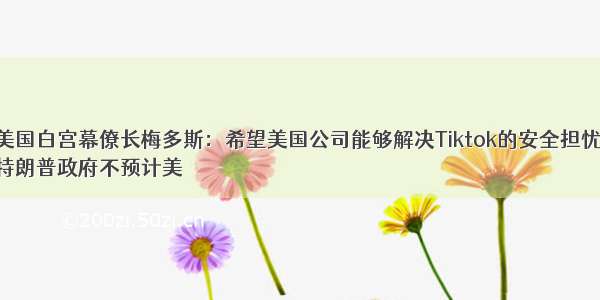
周四,特朗普总统在威斯康辛州莫西尼的一场竞选活动上。AL DRAGO FOR THE NEW YORK TIMES
相关限制将自周日开始实施,届时美国境内将禁止通过微信进行资金转账或付款。就微信而言,这些限制还将阻止任何公司向微信提供互联网托管、内容交付网络、互联网传输或对等服务,或在美国其他软件或服务中使用该应用的代码。
对TikTok提供服务的同等限制将于11月12日生效。
“今天的行动再一次证明特朗普总统将倾尽所能,确保我们的国家安全,保护美国人不受中国共产党的威胁,”商务部长威尔伯·罗斯(Wilbur Ross)在一则声明中说。
TikTok目前正在与美国软件商甲骨文(Oracle)就收购事宜进行谈判,并且有可能宣布一项缓和特朗普政府对国家安全担忧的交易。商务部在公告中表示,总统将解决TikTok的国家安全担忧问题的时限设至11月12日,如果获得解决,行政令中的限制将被解除。
TikTok拒绝置评,腾讯和甲骨文没有立即回应置评请求。
“实际上自周一凌晨起,它将在美国被关停,但只在美国,”罗斯说。
TikTok也将面对一些变化,但直至11月12日仍将被允许运行,罗斯说。届时如果无法达成能够足以解决特朗普政府担忧的交易,该应用将面临与微信一样的禁令。
“至于TikTok,自周日晚间开始,唯一真正的变化将是用户无法获得升级版本的应用、升级应用或维护,”他说。
罗斯用直白的语言来形容自这两款应用的威胁,将其服务比作美国与中国之间的窗户,而这扇窗户会让北京窥视美国人的日常生活。
“他们收集的是位置数据、你打算在线观看什么、你的喜好、你在参考什么这些数据,美国用户沉迷进行的每一个行为,都能成为另一边监测的对象,”他说。“这就是我们在试图压制的。”
相关报道
Ana Swanson是时报驻华盛顿记者,报道贸易和全球经济新闻。她此前在《华盛顿邮报》工作,报道贸易、美联储及经济方面的新闻。欢迎在Twitter上关注她 @AnaSwanson。
David McCabe报道科技政策。他于自Axios加入时报。
翻译:纽约时报中文网
Trump Administration to Ban TikTok and WeChat From U.S. App Stores
It issued new rules that will cripple the operation of two popular Chinese-owned apps in the United States.
The Trump administration said it would bar TikTok and WeChat from U.S. app stores as of Sunday night.Credit...Al Drago for The New York Times
By
Ana Swanson
,
David McCabe
and
Jack Nicas
Sept. 18,
Updated 7:02 p.m. ET
WASHINGTON — The Trump administration said Friday it would bar the Chinese-owned mobile apps WeChat and TikTok from U.S. app stores as of midnight Sunday, a significant escalation in America’s tech fight with China that takes aim at two popular services used by more than 100 million people in the United States.
In a series of moves designed to render WeChat essentially useless within the United States, the government will also ban American companies from processing transactions for WeChat or hosting its internet traffic.
Similar restrictions will also go into effect for TikTok on Nov. 12 unless the company can assuage the administration’s concerns that the popular social media app poses a threat to U.S. national security. TikTok, which is owned by China’s ByteDance, is currently in talks with Oracle about a deal that could transfer some control to the American software maker. The Commerce Department said the prohibitions could be lifted if TikTok resolves the administration’s national security concerns by the November deadline.
The actions follow an Aug. 6 executive order in which President Trump argued that TikTok and WeChat collect data from American users that could be retrieved by the Chinese government. The administration has threatened fines of up to $1 million and up to 20 years in prison for violations of the order.
ADVERTISEMENT
Continue reading the main story
TikTok, which does not directly operate in China, has become a wildly popular platform for sharing viral videos in the United States. WeChat is at the center of digital life in China, functioning as a chat app, a payment platform and a news source. It is a vital source of connection for the global Chinese diaspora, but also a conduit for Chinese propaganda and surveillance.
Friday’s move is the latest tangible sign that the global internet, which once promised to break down political borders and connect the planet’s citizens, is fracturing, driven by nationalism and security fears.
Refer your friends to The New York Times.
They’ll enjoy our special rate of A$1 a week.
People in China, the world’s most populous nation, can’t use the world’s most popular products, including Google, Facebook, YouTube and WhatsApp. Soon, Americans won’t be able to use WeChat. And even TikTok, perhaps China’s most successful digital export, is now under threat in the United States and has already been banned in India.
TikTok spokesman Josh Gartner said in a statement that the company was disappointed in the Commerce Department’s decision.
“We will continue to challenge the unjust executive order, which was enacted without due process and threatens to deprive the American people and small businesses across the U.S. of a significant platform for both a voice and livelihoods,” he said.
Continue reading the main story
Continue reading the main story
Tencent Holdings, which owns WeChat, called the rules “unfortunate” and said it would “continue to discuss with the government and other stakeholders in the U.S. ways to achieve a long-term solution.”
Oracle did not respond to a request for comment.
While the government is ordering a ban on the apps, it will largely be up to Apple and Google — which make the software that backs nearly all the world’s smartphones — to remove the apps from their stores. The two companies could face civil or criminal penalties for failing to comply with the new rules.
Apple and Google did not respond to requests for comment. Both have said in the past that they comply with the local laws in each country they serve.
Commerce Secretary Wilbur Ross, in an interview on Fox Business Network on Friday morning, said that the ban would initially have a much greater impact on WeChat.
“For all practical purposes it will be shut down in the U.S., but only in the U.S., as of midnight Monday,” Mr. Ross said.
TikTok would also face some changes, but would still be allowed to function until Nov. 12, Mr. Ross said, at which point it would face a ban if there was no deal that satisfied the administration’s concerns.
“As to TikTok, the only real change as of Sunday night will be users won’t have access to improved updated apps, upgraded apps or maintenance,” he said.
Continue reading the main story
Mr. Trump, at a news conference Friday, said he thought a deal to keep TikTok operating in the U.S. could move “very, very fast.”
“Maybe we can keep a lot of people happy but we have to have the total security from China,” he said, adding that the administration was talking to Oracle, Walmart and Microsoft.
The Nov. 12 deadline for TikTok will allow users of the app — who are primarily young — to continue using the service ahead of the election. TikTok has increasingly become a political force, with users posting in support of their favored candidates and offering commentary on current events. It has also been utilized as a political tool — hundreds of teenage TikTok users claimed credit for low turnout at a rally for Mr. Trump in Tulsa, Okla., this year.
The order is not as draconian as some companies had feared. It won’t affect the ability of multinational companies like Starbucks or Walmart to work with WeChat in China, where they commonly use the app as a payment platform. Major U.S. companies had pushed back against such a restriction with the Trump administration, saying it would put them at a disadvantage against Chinese competitors.
Still, the actions take aim at two of China’s most popular and successful tech exports, which knit together nearly two billion people worldwide.
Many of the internet services targeted by the government’s order “are like the FedEx for the data business,” said Charlie Chai, an analyst for 86Research, a research firm focused on Chinese companies. “If no FedEx is willing to carry the data package for WeChat, then WeChat is dead” in the United States.
The Chinese government had not issued any statements, and it was not immediately clear if China would retaliate. China has long blocked access to such American social media as Twitter, Facebook and WhatsApp that it cannot readily monitor or censor.
Continue reading the main story
Apple could have the biggest target on its back in China if it agrees to carry out the administration’s restrictions. Apple assembles most of its products there, and the country is Apple’s biggest sales market after the United States.
Other tech companies responded to the announcement with concerns that the effort could prompt similar action by other countries, to the detriment of American firms. Adam Mosseri, who leads Facebook’s Instagram product, said in a tweet that a TikTok ban “would be quite bad for Instagram, Facebook, and the internet more broadly.”
Vanessa Pappas, TikTok’s interim global head, said in a response to Mr. Mosseri that Facebook should “publicly join our challenge and support our litigation” against the ban. TikTok sued the Trump administration over the ban last month, arguing that the move had denied it of due process.
Tech companies have raised concerns about arbitrarily blocking apps without a clear policy process and have suggested it infringes on the First Amendment, said Adam Segal, a cybersecurity expert at the Council on Foreign Relations.
Mr. Segal said it was not entirely clear why the administration had chosen to go after these two Chinese services, and not other similar ones. “A lot of it just feels to me to be improvisational,” he said.
In a call with reporters Friday, a senior official with the Commerce Department pushed back on the idea that a ban would curtail Americans’ freedom of speech, saying the administration had targeted these apps in part because they are used to censor speech.
The Commerce Department declined to say whether the regulations could be used as a template for other Chinese companies, but noted that the secretary had the ability to prohibit additional transactions by the companies in the interest of national security.
Continue reading the main story
The administration is already taking a wider scope to review Tencent’s activities in the United States beyond WeChat. The government has sent letters asking a series of questions about data policies to several companies in which Tencent has partial ownership, including Spotify, Riot Games and Epic Games, the maker of the popular game Fortnite, according to people familiar with the situation.
Mr. Ross portrayed the threat from Chinese apps in stark terms, likening it to a window that allows Beijing to peer into the everyday lives of Americans.
“What they collect are data on locality, data on what you are streaming toward, what your preferences are, what you are referencing, every bit of behavior that the American side is indulging in becomes available to whoever is watching on the other side,” he said. “That’s what we’re trying to squelch.”
In its announcement, the Commerce Department said both WeChat and TikTok collected information from their users including location data, network activity and browsing histories. As Chinese companies, they are also subject to China’s policy of “civil-military fusion” and mandatory cooperation with Chinese intelligence services, it said.
Cybersecurity experts have debated the extent to which the bans would address national security threats. Many other Chinese-owned companies gather data from mobile users in the United States, as do Facebook, Google and other non-Chinese services.
TikTok has been downloaded nearly 200 million times in the United States, about 9 percent of the app’s downloads outside China, according to Sensor Tower, an app analytics firm. WeChat has been downloaded nearly 22 million times in the United States since , or about 7 percent of its downloads outside China.
Ahead of the Sunday deadline, people in the United States rushed to download WeChat. The app’s rank in the chart of top free iPhone apps soared to No. 100 from 1,385 on Friday, according to Sensor Tower.
Continue reading the main story
The U.S. ability to enforce the ban remains an open question, and it likely won’t be clear until the coming weeks whether the government’s effort to break the app has worked. Workarounds are likely to materialize. Users could switch their settings for access to an app store outside the United States, or switch to other Tencent apps, like a messaging service called QQ.
A Commerce Department official said Friday that the department’s focus would be not on policing individual users but gradually limiting the ability of the apps to operate in the United States. The official declined to discuss enforcement but said the administration hoped to work with American tech companies, noting that “every company that this touches is becoming increasingly aware of the challenges that these applications pose.”
Ana Swanson and David McCabe reported from Washington, and Jack Nicas from Oakland, Calif.
Ana Swanson is based in the Washington bureau and covers trade and international economics for The New York Times. She previously worked at The Washington Post, where she wrote about trade, the Federal Reserve and the economy.
@
AnaSwanson
David McCabe covers tech policy. He joined The Times from Axios in .
Jack Nicas covers technology from San Francisco. Before joining The Times, he spent seven years at The Wall Street Journal covering technology, aviation and national news.















